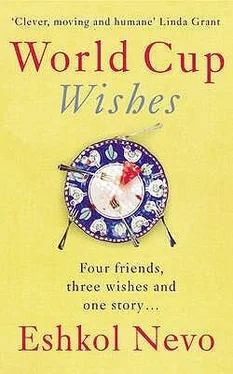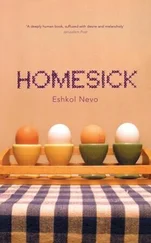It’s getting a bit chilly — I remember her saying — and I gave her my jacket even though I was cold too, and she put it on and hugged me from behind with her slender arms, and we leaned on the railings and watched together as evening fell on the bay and small lights were turned on in the houses, and rivers of light began to flow on the roads, and she said, what a perfect day you planned for us. And I thought how amazing it was that nothing had gone wrong so far, that usually, when I over-plan and have high expectations, something happens to ruin everything, but this time — this time, no. From the minute we left the house, everything had gone smoothly, and the weather was good, contrary to the forecast for rain, and we didn’t even meet people who knew me from high school, the thing I was most afraid of, for some reason. Later though, on the way to the car park, a car passed and someone inside wearing a white T-shirt yelled: hey, you two don’t go together! But that was so bizarre, so out of the blue that we decided we must have heard wrong and he had actually shouted, ‘Hey, how’s the weather?’ or ‘Hey, Green Monkeys for ever!’ which is the nickname for Maccabi Haifa’s most ardent fans. And in any case, there’s no sign of that strange shout in the picture, or of the fact that two weeks later she would leave me.
In the picture, we look like a pair of European tourists on their honeymoon in Haifa: Ya’ara has that half-mischievous half-serious look in her eyes, the one that makes everyone want her, and I look taller than in reality, and in the bottom corner of the frame, the photographer — a security guard in the Panorama Shopping Centre who Ya’ara enticed into leaving his post — managed to capture a large white ship that was making its way back into the port, or perhaps sailing out of it. At that point, it was hard to tell the difference.
*
Ya’ara didn’t come to the last day of the shiva. On the whole, there were fewer people. And most of the black chairs remained black. There were mostly family members at Amichai’s side, and perhaps it was the absence of witnesses that allowed the money issue to come to the surface.
It had popped up a few times even before then.
One day, a tall man had asked in a low voice whether they intended to file suit.
Someone from Givat HaMacam talked about a woman from their kibbutz who was left with an ugly scar on her knee after undergoing hair removal by laser, and she was awarded one hundred thousand shekels compensation. But that was before privatisation, so she was screwed because it was actually the kibbutz that got the money. She looked over at Amichai when she finished the story, but Amichai kept silent on that subject too, just as he’d kept silent on other subjects. As the days passed, his silence had turned from being a threatening and deeply meaningful one that sucked all the air out of the room, into the kind that everyone there had grown used to: they still had a certain respect for it, but allowed themselves, more and more, to ignore it.
Till the last day –
Speaking into the space of the room, Ilana’s aunt said that she had consulted with the attorney for the company where she worked and he told her that they could expect at least one million in compensation. At least!
And a distant cousin of Amichai’s — she too addressing no one in particular — said that a lot depended on the attorney. And that they should invest in a good one because, in the end, it would pay off.
And a widowered accountant, who every day of the shiva had described in detail — whether it was appropriate or not — the difficult time he’d had after his wife’s death, took a fountain pen out of his shirt pocket, unscrewed the cap and said that they should also take into account the deceased’s life insurance, so the final amount could grow to two million shekels and even more.
And Ilana’s brother mumbled, a million, two million, what does it matter. Nothing will bring her back.
And Ilana’s mother said, at least the children will be taken care of.
And Amichai’s mother sighed — a sigh of both sadness and surprise — two million is money. Maybe you’ll finally be able to move into a more spacious house.
And Ilana’s brother, no longer mumbling, said what do you mean, a house? What do they need a new house for now? They’d be better off putting the money into a savings account.
Then the widower removed the cap from his fountain pen again and said, excuse me for butting in, but a house is an investment that can pay an excellent dividend. Especially the way the market is now, with such low prices because of this new Intifada.
And Ilana’s mother raised her voice, I don’t understand all this talk! Aren’t you ashamed? Obviously the money should go straight into a trust fund!!
And Amichai’s mother — who had been trying to hide her reservations about Ilana’s mother throughout the entire shiva, and it was that exaggerated attempt that gave her away over and over again — said: it’s obvious to you.
And Ilana’s mother narrowed her eyes and said, what does that mean?
And Amichai’s mother said, exactly what you think it means.
And Amichai rose from his chair, slowly, and for the first time that week, opened his mouth and said: enough.
Since I’d had nothing to contribute to the financial conversation, I’d been watching his facial expressions while it was taking place.
At first, his eyes were sunken, dark. His chin drooped. Defeated. The words seemed not to be reaching his ears. Then — perhaps he caught a snatch of something, a sliver of a word — his eyebrows were stirred into action and began to follow the exchange. Then his lower lip started to tremble and he tried to bite it, control it. But the trembling spread to his upper lip.
Then he stood up.
I looked into his eyes. I was sure I’d see a terrible fury in them, but no. To my surprise, the old, familiar spark was there, the one that always heralded a brilliant idea.
Enough, he said. I don’t want to hear this kind of talk. I earn enough money at Telemed to take care of my children’s future. And if there’s any compensation money … or insurance … I plan to use it for something else … something Ilana would have wanted …
What, for instance? Ilana’s brother asked, a touch of puzzlement in his voice.
I don’t know yet, Amichai replied, a bit embarrassed. Maybe I’ll establish some kind of non-profit organisation. An NPO. Maybe something else. I don’t know.
An NPO? For what? her brother persisted.
I just told you, I don’t know, Amichai replied reluctantly. And sat down. And wrapped himself in silence once again.
*
Yeah, right, Churchill said sceptically when I called to tell him what Amichai had said at the shiva.
He’s confused now, Ofir said. I’ve treated people in his condition and you shouldn’t take anything they say seriously.
*
But a month after Ilana’s death, the three of us received calls from Amichai. We’ll meet at my place, he told us. I want to ask your advice about the organisation.
I don’t know, Churchill said to me dubiously. It sounds like another one of those Amichai Tanuri far-fetched ideas. He doesn’t even know what this charitable organisation of his will be for. Mark my words: it’ll end with him wanting us to sing ‘Shimon My Man’ together.
He’s counting on the fact that I was a copywriter, Ofir complained to me, but I’m all rusty now when it comes to that whole business of … you know, words.
What does it matter, I said, trying to persuade them. Your friend wants help, so you help him. Then ask questions.
*
A few hours before we were supposed to meet, Amichai called to cancel. There was a tape of children’s songs playing too loudly in the background.
Читать дальше












